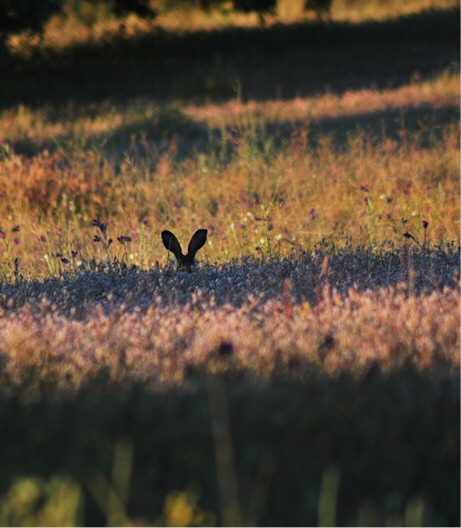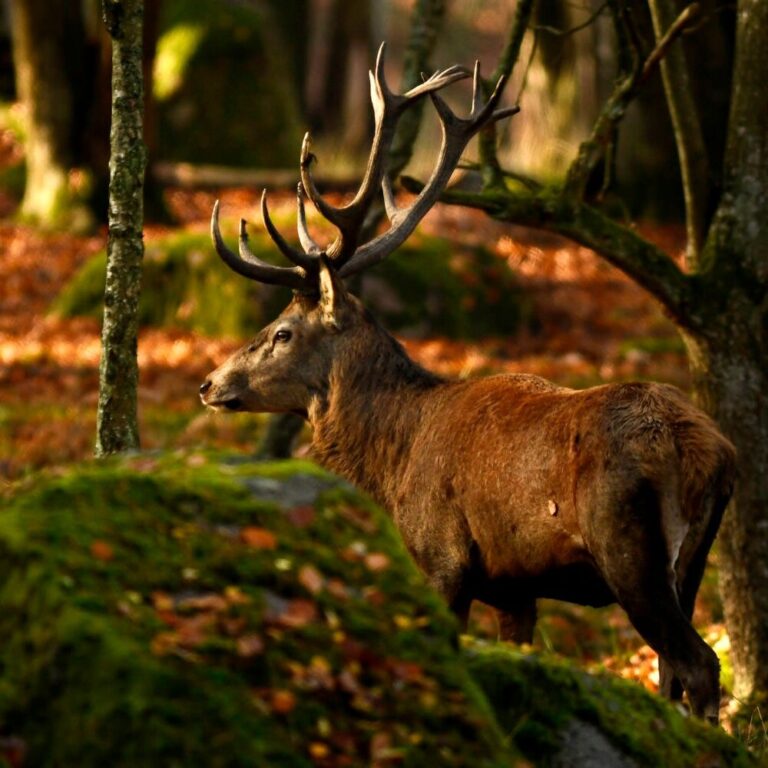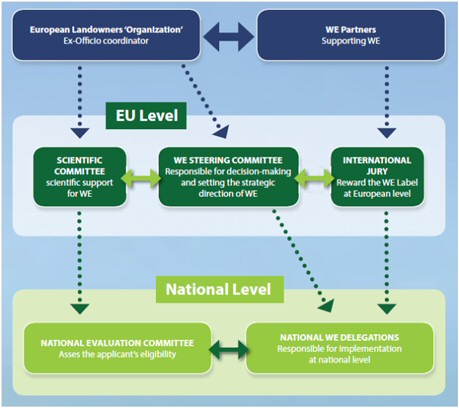About
WE are
The WE Label holders are deeply committed to their land and actively contribute to the economic, social, and environmental development of rural areas. They exemplify the vital integration of sustainable land use with local human development.
Since 2004, the Wildlife Estates (WE) Label has been recognising exceptional territories across Europe for their outstanding biodiversity and wildlife management. Today, with over 580 estates spanning 19 countries and covering more than 2 million hectares, the Wildlife Estates project continues to grow steadily. In 2024 alone, 60 new estates joined the label, with notable contributions from Scotland, Belgium, and Spain, as well as a remarkable new entry from Italy.
Mission: The WE Label advocates for biodiversity conservation and sustainable land management by engaging landowners and rural stakeholders to promote best practices for wildlife management. Through collaboration, education, and policy advocacy, WE fosters the responsible stewardship of rural landscapes, balancing economic, social, and environmental interests to protect and restore Europe’s natural heritage
Vision: Creating Europe where biodiversity thrives through responsible land stewardship, sustainable rural development, and collaboration between private and public actors, ensuring resilient ecosystems for future generations.
Our Mission

We believe in Sustainable Wildlife Management, therefore we...
1. Protect biodiversity for future generations
Appreciation of the importance of biodiversity preservation is the fundamental reason for establishing the WE Label. European habitats are increasingly threatened by factors such as fragmentation, degradation, and destruction caused by changes in land-use, intensification and conversion of production systems, abandonment of biodiversity-friendly traditional practices, infrastructure development, urbanization, and insufficient rural funding. Additional pressures include pollution and invasive alien species. Climate change further stresses ecosystems essential for societal well-being. Halting biodiversity loss is critical for restoring ecosystems’ resilience to climate change.
2. Collaborate for biodiversity enhancement
Faced with these challenges, WE has successfully created and enhanced habitats to benefit biodiversity and restore natural conditions favorable for game species. This success stems from significant collaboration among Europe’s farmers, foresters, hunters, and anglers, all of whom indirectly support wild flora and fauna. These groups form a crucial link in achieving sustainable rural development.
3. Conserve through wise use
The “conservation through wise use” philosophy promotes responsible wildlife utilization and recognizes wildlife’s intrinsic spiritual value. It emphasizes proactive and positive wildlife management through legitimate measures aimed at enhancing survival and productivity of certain species or managing populations to minimize negative impacts on other species and ecosystems.
What we do
WE provide solutions to land-use challenges
Supporting sustainable rural economies
Rural estates are essential to sustaining rural economies, contributing significantly to addressing global food, energy, and environmental challenges. With declining financial support to rural sectors, private initiatives and financing instruments are increasingly vital to promoting sustainable rural development.
Enhancing private and public collaboration
As environmental degradation accelerates, private land managers’ roles become increasingly critical in preserving natural landscapes through effective management practices. The WE Label actively fosters collaboration between private and public stakeholders to demonstrate that private landowners’ efforts align seamlessly with biodiversity conservation principles.
History and Background
The Wildlife Estates (WE) Label was conceived in 2004, when key actors from national authorities and private organisations from areas related to nature conservation and land management took the opportunity to develop a philosophy entwining the concepts of wildlife management and sustainable land use. Since then, the project has expanded progressively to promote biodiversity conservation in the face of emerging political, economic and social concerns at both the EU and local levels.
The network of labelled estates started with Spain, Belgium, France, Portugal and the Netherlands, and has been continuously enlarging ever since. Currently, Western countries such as Spain, Portugal, Sweden, France, Belgium and the region of Scotland have the most representatives. As the project grew, the establishment of National Delegations became necessary, which in turn resulted in even further increased recognition and publicity of the initiative in each participating country. Growth of the initiative was paralleled with the development of evaluation grids for each biogeographic region (Mediterranean, Boreal, Alpine and Continental).

Organizational structure of WE
The WE Label project is represented in 19 European countries mostly through a decentralized network. The Ex-officio coordinator is situated at the ELO office in Brussels, Belgium, from where the activities of the National WE Delegations are coordinated.
ELO – Ex-officio coordinator
ELO is a unique federation of national associations from Europe and beyond, dedicated to representing the interests of landowners, farmers, foresters, and rural entrepreneurs. Located in Brussels, the heart of the European Union, ELO stands as an independent non-governmental organization providing support to its members on a range of countryside-related matters. These encompass land management, agriculture, forestry, hunting, land access, and property rights.
Steering Committee
The project is overseen by the Steering Committee, composed of the representatives (main coordinators) of all National Delegations. The Steering Committee is responsible for taking decisions and managing the project in terms of strategy, progress, quality assurance, and dissemination.
Scientific committee
The general aim of the Scientific Committee is to facilitate the creation and validation of an objective methodology for the WE Label in each country. It is a scientific board that advises national delegations on matters relating to the methodology. This Committee is composed of eight highly qualified experts from the different biogeographic regions of the EU: Macaronesian, Mediterranean, Atlantic, Continental, Pannonian, Boreal, Arctic, and Alpine. They assess the validity of the different scientific criteria and principles that embody the core principles of the WE Label.
National Wildlife Estates
National Delegations award the WE Label for their country. They are responsible for evaluating the applications of estates/ territories who wish to obtain the Label.

European Level
- European Landowners’ Organization acts as an Ex-Officio coordinator.
- WE Partners provide additional support.
- WE Steering Committee oversees decision-making and strategic direction.
- Scientific Committee provides essential scientific backing.
- International Jury rewards and recognizes WE Label efforts at a European scale.
National Level
- National Evaluation Committee assesses applicant eligibility.
National WE Delegations ensure national-level implementation and compliance with the WE standards.
